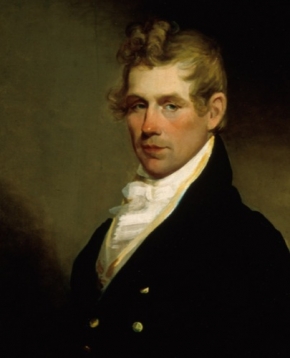You are here
Circuit Court Opinions:
Associate Justice John McKinley, Bank of Augusta v. Earle (1839)

Bank of Augusta v. Earle, unpublished (C.C.S.D. Ala. 1839) [Ninth Circuit], reversed, 38 U.S. 519 (1839)
While riding circuit, Justice McKinley heard three cases in which banks chartered in Georgia, Pennsylvania, and Louisiana sued to recover on bills of exchange they had purchased in Alabama. McKinley ruled for the defendants in all three cases on the grounds that the banks lacked legal authority to make contracts in Alabama and that the agreements under which they sought to recover were void. His ruling was hailed by proponents of states’ rights for its recognition of Alabama’s power to make policy that implicitly excluded foreign banks from doing business within its borders. On the other hand, the decision posed a threat to interstate commerce and economic expansion.
The three cases went to the Supreme Court (consolidated under the name Bank of Augusta v. Earle), which reversed McKinley’s rulings. In his opinion for the Court, Chief Justice Roger Taney acknowledged that a corporation was a creature of the state within which it was chartered, but asserted that it could be recognized and could make contracts in a foreign state, just as a natural person could. The Court held that “comity between foreign nations” applied to the states as well, allowing a corporation to do business in a foreign state unless the laws of that state specifically prohibited it. In this case, Alabama’s constitution set strict limits on the power of its legislature to grant bank charters, but the state had no law prohibiting a foreign bank from purchasing bills of exchange.
McKinley’s circuit opinions, including Bank of Augusta, were not published, but his dissent to the Court’s opinion revealed his thinking about the case, which rested mainly on principles of state sovereignty. First, McKinley objected to the application of a principle of the law of nations to the state of Alabama “although no such principal has been adopted or admitted by that state.” The banks had no powers other than those conferred by their charters, he reasoned, so the Court’s holding was equivalent to a ruling that Alabama had adopted as part of its law bank charters granted by other states. “As the majority of the Court have not expressly stated whether Alabama has adopted the whole charters of the banks, or what parts they have adopted,” he wrote, “there is now no certainty what the law of Alabama is on these charters.”
McKinley also disagreed with the majority that the transactions were not prohibited by Alabama law. The banking provisions of the state constitution, he asserted, established “a clear and unequivocal policy on the subject of banking.” The charters of the out-of-state banks, had they been granted by Alabama’s legislature, would have violated these provisions, which were enacted to ensure that a large portion of profits derived from banking would go to the state. “If, therefore, the legislature could not adopt the charters … nor authorize the banks to deal in exchange, without violating the constitution of Alabama, how can it be said that the contracts in controversy are not against the policy of the laws of Alabama?” he concluded. His stance failed to win support from any other member of the Court, and the case helped to establish the presumptive right of corporations to do business in other states.
